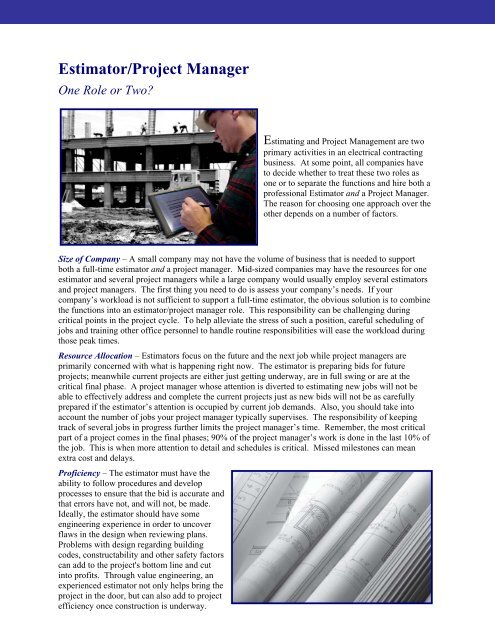Estimator/Project Manager : One role or Two? pdf - ConEst
Estimator/Project Manager : One role or Two? pdf - ConEst
Estimator/Project Manager : One role or Two? pdf - ConEst
You also want an ePaper? Increase the reach of your titles
YUMPU automatically turns print PDFs into web optimized ePapers that Google loves.
<strong>Estimat<strong>or</strong></strong>/<strong>Project</strong> <strong>Manager</strong><strong>One</strong> Role <strong>or</strong> <strong>Two</strong>?Estimating and <strong>Project</strong> Management are twoprimary activities in an electrical contractingbusiness. At some point, all companies haveto decide whether to treat these two <strong>role</strong>s asone <strong>or</strong> to separate the functions and hire both aprofessional <strong>Estimat<strong>or</strong></strong> and a <strong>Project</strong> <strong>Manager</strong>.The reason f<strong>or</strong> choosing one approach over theother depends on a number of fact<strong>or</strong>s.Size of Company – A small company may not have the volume of business that is needed to supp<strong>or</strong>tboth a full-time estimat<strong>or</strong> and a project manager. Mid-sized companies may have the resources f<strong>or</strong> oneestimat<strong>or</strong> and several project managers while a large company would usually employ several estimat<strong>or</strong>sand project managers. The first thing you need to do is assess your company’s needs. If yourcompany’s w<strong>or</strong>kload is not sufficient to supp<strong>or</strong>t a full-time estimat<strong>or</strong>, the obvious solution is to combinethe functions into an estimat<strong>or</strong>/project manager <strong>role</strong>. This responsibility can be challenging duringcritical points in the project cycle. To help alleviate the stress of such a position, careful scheduling ofjobs and training other office personnel to handle routine responsibilities will ease the w<strong>or</strong>kload duringthose peak times.Resource Allocation – <strong>Estimat<strong>or</strong></strong>s focus on the future and the next job while project managers areprimarily concerned with what is happening right now. The estimat<strong>or</strong> is preparing bids f<strong>or</strong> futureprojects; meanwhile current projects are either just getting underway, are in full swing <strong>or</strong> are at thecritical final phase. A project manager whose attention is diverted to estimating new jobs will not beable to effectively address and complete the current projects just as new bids will not be as carefullyprepared if the estimat<strong>or</strong>’s attention is occupied by current job demands. Also, you should take intoaccount the number of jobs your project manager typically supervises. The responsibility of keepingtrack of several jobs in progress further limits the project manager’s time. Remember, the most criticalpart of a project comes in the final phases; 90% of the project manager’s w<strong>or</strong>k is done in the last 10% ofthe job. This is when m<strong>or</strong>e attention to detail and schedules is critical. Missed milestones can meanextra cost and delays.Proficiency – The estimat<strong>or</strong> must have theability to follow procedures and developprocesses to ensure that the bid is accurate andthat err<strong>or</strong>s have not, and will not, be made.Ideally, the estimat<strong>or</strong> should have someengineering experience in <strong>or</strong>der to uncoverflaws in the design when reviewing plans.Problems with design regarding buildingcodes, constructability and other safety fact<strong>or</strong>scan add to the project's bottom line and cutinto profits. Through value engineering, anexperienced estimat<strong>or</strong> not only helps bring theproject in the do<strong>or</strong>, but can also add to projectefficiency once construction is underway.
Estimating provides the inf<strong>or</strong>mation required f<strong>or</strong> managing the material costs and lab<strong>or</strong> hours efficientlyand effectively. This job management inf<strong>or</strong>mation is imp<strong>or</strong>tant to the project manager f<strong>or</strong> job costingand tracking. Without a good solid estimate, project management is no m<strong>or</strong>e than putting out fires andresponding to crisis situations. <strong>Project</strong> managers need to be task-<strong>or</strong>iented people with a strong sense ofurgency and must also focus on starting and finishing tasks on schedule. The project manager’sknowledge of their crews strengths and weaknesses as well as the w<strong>or</strong>king conditions on a job site andtheir own experience in the field make them best suited to schedule the right people f<strong>or</strong> the job tocomplete the project on time.Specialization – Look at estimating and project management as a production line. <strong>Estimat<strong>or</strong></strong>s estimate,and project managers manage. The split between these two job professions allows each to become m<strong>or</strong>eefficient. A full-time estimat<strong>or</strong> becomes m<strong>or</strong>e proficient and able to complete accurate bids quickly.The experience in the field f<strong>or</strong> a full time project manager develops his <strong>or</strong> her team management skillsand product expertise to complete the project on schedule. Both individuals improve their skillsbecause they specialize in their profession.Communication – An advantage f<strong>or</strong> the individual who is both the estimat<strong>or</strong>/project manager is thatthere is no miscommunication between the two job functions. When the estimat<strong>or</strong> is also managing theproject, he <strong>or</strong> she is m<strong>or</strong>e familiar with details and conditions of the job thus saving time in turning theproject over. Just be sure to avoid the temptation to delay decisions to the project management stagewhen you are perf<strong>or</strong>ming both <strong>role</strong>s…the result could be a loss of time and money.When the <strong>role</strong>s are separated, it is essential that the estimat<strong>or</strong> and the project manager communicateeffectively with each other. The project manager has specific knowledge of the w<strong>or</strong>k required f<strong>or</strong> thejob and is, theref<strong>or</strong>e, an imp<strong>or</strong>tant resource f<strong>or</strong> the estimat<strong>or</strong> in producing an accurate estimate. A goodestimat<strong>or</strong> is laying the framew<strong>or</strong>k f<strong>or</strong> the project. If the estimate is done completely and accurately, theproject manager will experience fewer problems on the job.The success of both the estimat<strong>or</strong> and the project manager requires a cooperative team environment ofencouragement and supp<strong>or</strong>t. Both <strong>role</strong>s are critical to the success of your company. Skilled projectmanagement is often the difference between a profitable job and one that produces a loss. Effectiveestimating and job planning of lab<strong>or</strong> schedules and material procurement are maj<strong>or</strong> fact<strong>or</strong>s indetermining the actual cost of a project. Ultimately, it is careful job planning and precise planexecution that is the necessary groundw<strong>or</strong>k that will reap desired benefits and profits f<strong>or</strong> your companywhether you hire one individual as your estimat<strong>or</strong>/project manager <strong>or</strong> separate the two <strong>role</strong>s betweentwo individuals.written by, Ge<strong>or</strong>ge HaguePresident/CEO<strong>ConEst</strong> Software Systems






